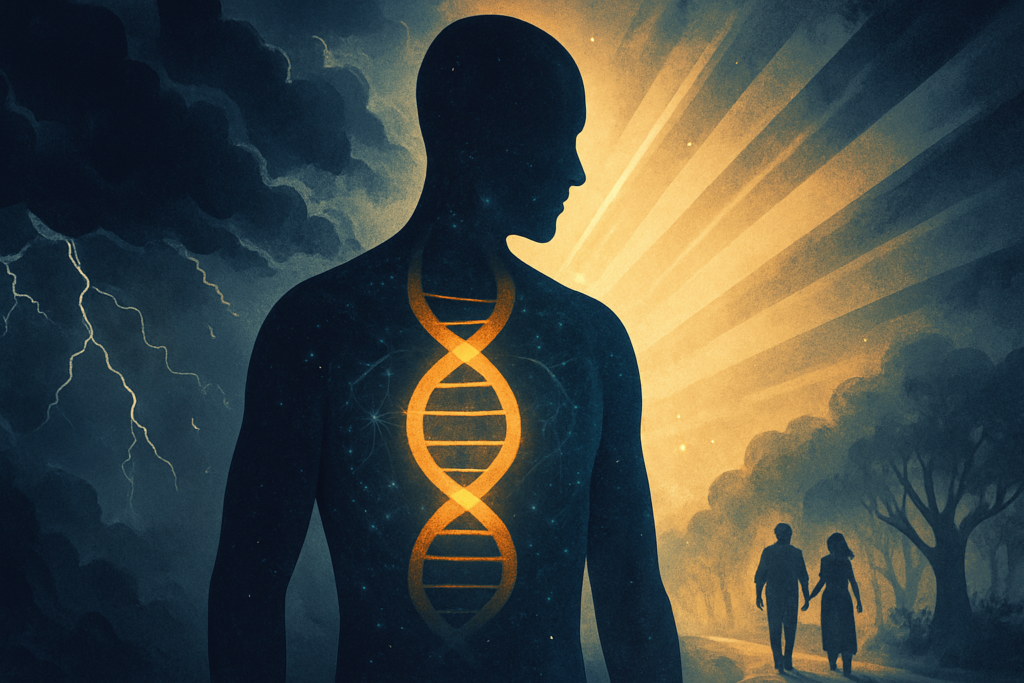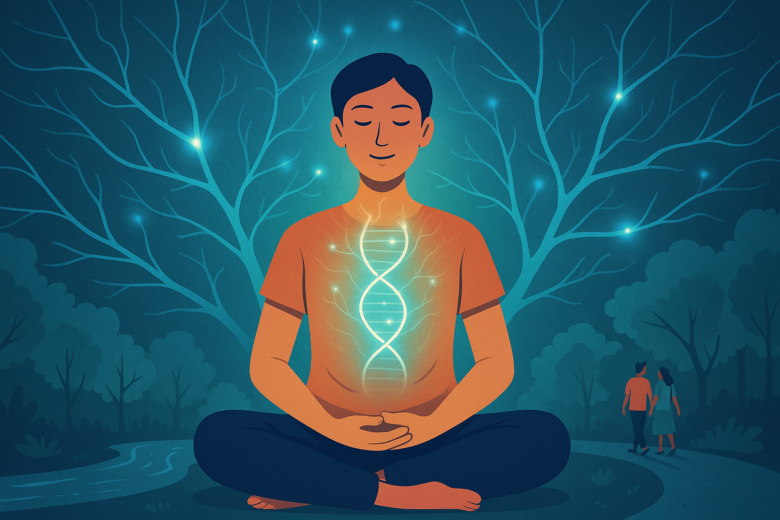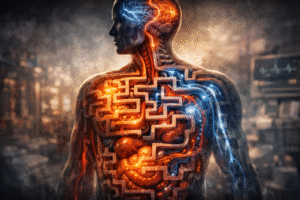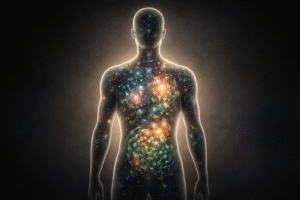Fun Fact: Emotional trauma doesn’t just live in your head—it may be coded in your cells.
Have you ever felt like your body “remembers” something long after your mind has moved on? Maybe it’s a racing heart when you hear raised voices, or a stomach that clenches at the scent of antiseptic. For decades, trauma was viewed as purely psychological. But now, a wave of new science is revealing something astonishing: trauma might literally change your biology.
Welcome to the new biology of emotions—where feelings don’t just affect your mood, they may alter your molecular makeup.
The Science Behind Emotional Imprints
At the heart of this revelation is a field called epigenetics—the study of how behaviours and environment can cause changes that affect the way your genes work. Unlike genetic mutations, epigenetic changes don’t alter your DNA (deoxyribonucleic acid) sequence. Instead, they affect how your DNA is “read” by your cells.
Think of it like a playlist: your DNA is the full album, but your life experience determines which tracks get played.
According to researchers, traumatic experiences—especially those in early childhood—can leave chemical marks on genes that control stress response, immunity, and even brain development. These marks can either “turn off” or “turn up” certain genes, influencing how your body reacts to stress for years or even generations.
Case Study: The Children of War
One of the most cited studies in this area involved Holocaust survivors and their children. Researchers at Mount Sinai Hospital in New York found that the children of Holocaust survivors had altered stress hormone levels—and epigenetic markers that weren’t present in control groups.
This suggests that trauma didn’t just affect the survivors emotionally. It biologically prepared their children to live in a world of danger and unpredictability, even if they themselves never experienced war.
The implication? Your biology may not just be shaped by your life—but by your parents’ emotional history.
Trauma Leaves a Cellular Footprint
Another groundbreaking area of study involves Adverse Childhood Experiences (ACEs)—events like abuse, neglect, or exposure to violence. Children with high Adverse Childhood Experience (ACE) scores are significantly more prone to developing chronic health conditions like heart disease and diabetes as they grow older.
But why?
Scientists have found that trauma can dysregulate the hypothalamic-pituitary-adrenal (HPA) axis, a key system that manages stress hormones like cortisol. If that system gets stuck in “overdrive,” your body remains in a state of constant alertness. Over time, this contributes to inflammation, organ wear, and premature ageing.
So, yes—trauma can change your cells. It can literally wear them down.

Emotions and Immunity: A Two-Way Street
There’s more. Researchers have also discovered that emotional trauma can suppress the immune system. When you’re emotionally overwhelmed, your body allocates energy toward survival (fight or flight) rather than healing or recovery.
In a study at Ohio State University, students who experienced chronic stress had slower wound healing and were more prone to infections. Another study found that trauma survivors had elevated inflammation markers—proteins in the blood that signal distress.
This connection between mind and immunity has sparked interest in psychoneuroimmunology—the study of how emotions influence the immune system. And it’s rewriting how we understand diseases from depression to cancer.
Healing Is Biological, Too
Here’s the good news: just as trauma can change biology for the worse, healing can change it for the better.
Practices like mindfulness, therapy, yoga, and even exposure to nature have been shown to reverse some of the biological effects of trauma. In one study published in Translational Psychiatry, participants who engaged in mindfulness-based stress reduction saw epigenetic changes that improved immune function.
Your body listens. And with the right tools, it can heal.
The Role of Modern Medicine—and Tech
Some companies are now trying to measure this bio-emotional connection. For instance, Emotiv (a neurotechnology company) has developed wearable EEG (electroencephalogram) headsets that track brainwave responses to emotional triggers. Others, like MyDNA (a consumer genetics company), are exploring how lifestyle advice could be tailored based on your epigenetic profile.
While these approaches are still in their early days—and should be taken with caution—they reflect a growing interest in merging emotional wellness with biological insight.
This isn’t just mental health. It’s molecular health.
Rethinking Mental Health as Cellular Health
All of this science points to a radical idea: that our emotional experiences aren’t just fleeting feelings. They’re biologically embedded. Trauma changes the chemical landscape of the body. But so does healing.
In India, where mental health discussions are still stigmatised, this cellular lens could change the conversation. No longer is it just “in your head.” It’s in your bloodstream, your neurons, your genes. And if that’s the case, then seeking therapy, practising self-care, or even crying when you need to isn’t weakness. It’s cellular repair.
Conclusion: Emotions Matter, Right Down to the Molecule
We’ve long separated mental and physical health—but the walls are crumbling.
From Holocaust survivors to children of conflict zones, from patients with chronic illness to survivors of abuse, the message is clear: emotions matter. They shape your body. Trauma can change your cells—but so can hope.
Maybe it’s time to ask not just “How are you feeling?”—but “How are your cells doing?”
Author’s Note
As science catches up with what many of us have intuitively felt for years—that our bodies carry our emotions—we’re witnessing a shift in how we view both trauma and healing. This article is a small invitation to look within, be kinder to your body, and treat your emotions not as disruptions, but as signals worth decoding.
G.C., Ecosociosphere contributor.
References and Further Reading
- Scientific American: How Trauma Affects the Brain
- NIH: Epigenetic Effects of Stress
- Mount Sinai Study on Holocaust Survivors
- Cocco, G., & Amiet, P. (2021). Epigenetics and Medicine. OBM Genetics. https://doi.org/10.21926/obm.genet.2103133
- CBD Oil to Reduce Craving & Anxiety Caused by the Heroin Abuse. https://www.cbdeighty.com/cbd-oil-to-limit-the-anxiety-and-cravings-caused-by-the-heroin/




